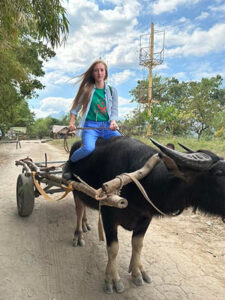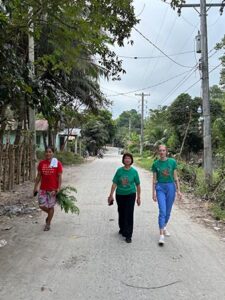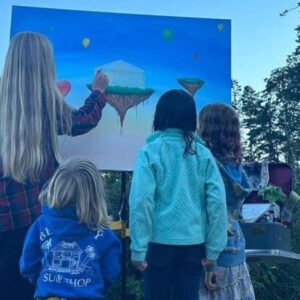November 20, 2024
Beyond the scrubs: A global nursing journey
The collegiate journey is never linear, and the last thing Kathryne Ford ’23 expected was for her undergraduate career to take her to the Philippines for two months after she graduated from The College of St. Scholastica with a Bachelor of Science in Nursing.
Ford describes herself as a creative, an artist, and a lover of nature. A younger version of herself had imagined attending fashion school in Los Angeles. When this plan fell through, Ford knew she had to reevaluate her priorities and passions. She knew she liked working with people and science, having grown up with a heavy focus on community and mutual aid. After receiving a generous scholarship from St. Scholastica, she knew that was where she was meant to be.
Gaining compassion and a new perspective
In the spring semester of her freshman year in college, Ford was hospitalized and diagnosed with bipolar disorder. “It was kind of a wild rollercoaster, learning how to navigate that at the same time as being a brand new nursing student. It changes the way you experience time, the way that you see yourself in your relationships and your future, how you experience pain and how much you sleep. You need all these things,” she said of the diagnosis. “But as a nurse, it gives me a lot of empathy. You have a little bit more patience and insight into what people might find calming.”
 This personal experience gave Ford a front-row seat to what discrimination can look like within the healthcare sector. “Sometimes I think people will hear that somebody has a disorder like that and then totally write them off. It’s like, ‘They don’t know what’s going on’ or ‘They can’t handle their emotions, so their reactions to things aren’t valid anymore.’”
This personal experience gave Ford a front-row seat to what discrimination can look like within the healthcare sector. “Sometimes I think people will hear that somebody has a disorder like that and then totally write them off. It’s like, ‘They don’t know what’s going on’ or ‘They can’t handle their emotions, so their reactions to things aren’t valid anymore.’”
In the midst of this battle, Ford had to find a new way to interact with the world around her. The Center for Equal Access served as a useful resource in assisting her with accommodations and learning how to implement them. Alongside a tight-knit circle of friends, she was able to adjust to this new normal and find what worked and what did not. Through the challenges she faced, Ford gained a new perspective and compassion for patients she found she could use wherever she landed after graduation, including communities far from home.
Nursing clinical connections abroad
The first time Ford went to the Philippines was close to halfway through her senior year when she was afforded the opportunity to complete her capstone project abroad, as part of the Transcultural Nursing in the Philippines study abroad program. “Honestly, I was not sure what it was going to be like going there. I wasn’t sure if we were going to be doing mission work. I knew it was going to involve clinical hours somehow,” she said. But she knew it would be a once-in-a-lifetime experience. The program was led by Dr. Gina Diaz, an associate professor in the nursing program and a Filipino native herself.
While there, Ford befriended a preceptor and a host who were both present for the nursing cohort during this trip, one of whom ran a series of free clinics within the mountains for people who lived there. Ford was so moved by the work that these women were doing and they invited her to come back. She readily took them up on that offer and the December after she graduated in 2023, she traveled back to the Philippines, this time alone.
A window into another culture
“I was very nervous, going there by myself. [It was] a very intimate, very vulnerable window into another culture… being a nurse in the heart of Tondo and understanding that the hospitals don’t always pay enough to sustain even an apartment. Living in that space was very different, but I was just really honored to be able to do that. I gained a lot of confidence and a lot of perspective. That type of exposure is the opportunity of a lifetime that does not come every day.”
 Stationed in the mountains, Ford helped with the running of the pop-up clinics, sometimes seeing up to 300 children in a day. One of the hardest parts of international travel is the language barrier that might be faced. “I tried to learn Tagalog before I arrived, practicing every day and that gave me a sense of false confidence, because, pretty soon, we figured out that my grammar was backward and I was speaking Google Translate and mispronouncing a lot of things.”
Stationed in the mountains, Ford helped with the running of the pop-up clinics, sometimes seeing up to 300 children in a day. One of the hardest parts of international travel is the language barrier that might be faced. “I tried to learn Tagalog before I arrived, practicing every day and that gave me a sense of false confidence, because, pretty soon, we figured out that my grammar was backward and I was speaking Google Translate and mispronouncing a lot of things.”
While a translator was provided during her time, learning the language was an integral tool for breaking the barrier that she felt existed between her and the patients she was seeing. “I feel like with the kind of work that you’re doing, it just shows that you care to another level if you put in the time and effort to learn a language, and I never want to rely on the possibility of other people knowing and being comfortable with English,” she said.
A cultural exchange
Through this exchange, Ford was introduced to a culture that welcomed her with open arms and offered her an insider’s view of life in the Philippines. “I got invited to so many things that I never expected to see in such an intimate way. I was at religious ceremonies, including a baby’s christening, in people’s homes, and in all kinds of places. I was even staying in an employee dorm that other nurses live in.”
 Living with the people of the Philippines for two months brought some fresh perspective to her career as a nurse in the United States. “There were a lot of things there that I think would make our health system better, but that’s more ideologies and attitudes, including stewardship to the environment and its resources, and the way that people approach healthcare in its entirety.
Living with the people of the Philippines for two months brought some fresh perspective to her career as a nurse in the United States. “There were a lot of things there that I think would make our health system better, but that’s more ideologies and attitudes, including stewardship to the environment and its resources, and the way that people approach healthcare in its entirety.
But then there are also some things there that were surprising to me that served as a warning to what can happen when we cut things too thin, like the nurse to patient ratios,” she said. “When I returned to my work here, I was far less disgruntled with my job and with some of those conditions that I was talking about because I had experienced just something that blew some of those things that I thought were unmovable standards kind of out of the water.” All in all, there is so much we can learn and so much to be admired from the care that the people there provide.
Integrating experience with practice
After her time abroad came to an end, Ford wanted to focus her mind solely on what was in front of her. She has decided to think critically about her experiences and how she is able to integrate the medical practices of the respective countries through a mutual exchange of resources.
One of the barriers she describes as having faced while in the Philippines was being unable to prescribe medication to people. Looking forward, she would like to pursue her Doctor of Nursing Practice (DNP), especially as it will allow her to prescribe medications when traveling and serving within the community.
The nursing program at The College of St. Scholastica places great emphasis on Benedictine values, teaching a rigorous curriculum through the lens of the liberal arts. Ford’s praise for compassion and empathy is a testament to the high quality of the program. “One thing I really credit St. Scholastica for is bringing awareness to community health nursing,” said Ford.
A great way to observe the world
Throughout the summer, Ford was making collaborative live paintings in the Lincoln Park neighborhood of Duluth alongside her roommate. The paintings were sold to support afterschool programming. “It’s about remembering the effect of my actions on the health of this community, That’s what public health is really about.”
As part of her creative and community-centric efforts, she has also had the opportunity to paint for an Oktoberfest event, where the proceeds were donated to the Damiano Center, a local community center. “I’m lucky to have a job where I’m really comfortable, so being able to pass things along is a good thing.”
 Through live painting at the Rathskeller, a local speakeasy, her creative door has also been opened to other opportunities, including the chance to paint the mural that is currently on display at the Miller Hill Mall. “I think that art is a really important part of processing what’s going on and processing emotions and self-discovery, no matter what medium I’m working in. It’s like breathing. It’s always going to be happening in one way or another. I think art’s also a really great way to observe the world around you.”
Through live painting at the Rathskeller, a local speakeasy, her creative door has also been opened to other opportunities, including the chance to paint the mural that is currently on display at the Miller Hill Mall. “I think that art is a really important part of processing what’s going on and processing emotions and self-discovery, no matter what medium I’m working in. It’s like breathing. It’s always going to be happening in one way or another. I think art’s also a really great way to observe the world around you.”
Ford’s advice to students is all about expanding horizons: “The world is so big beyond these walls. It can turn into such a fishbowl sometimes, but try to break the routine a little bit, or go to something that isn’t just the typical college routine or one of the typical college spots. And really explore because there are really cool pockets and some really cool things going on. If you have your people backing you and you have friends that you feel passionate about, that would make such a big difference. You can make it, you’re worth it!”


